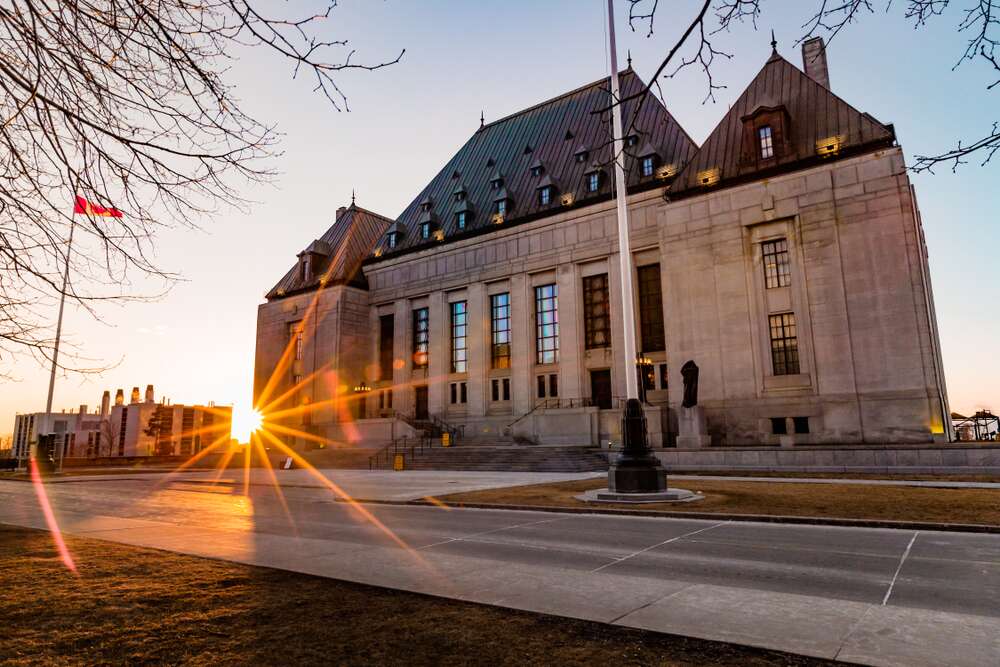In March the Supreme Court of Canada delivered its decision Anderson v. Alberta on whether Canada and Alberta must pay a portion of Beaver Lake Cree Nation’s legal fees in its landmark treaty infringement case.
The Court allowed the appeal and held that First Nations should not be required to choose between meeting the basic needs of their communities and pursuing publicly important litigation in order to qualify for advance costs.
Like the recent, long-overdue papal apology for harms to Indigenous Peoples as a result of Canada’s residential school system, the Anderson decision stirs mixed responses. While the decision represents a positive step forward for Indigenous Peoples seeking to protect and vindicate their rights, it also stands as a reminder of the colonial foundations on which Canada rests.
Background
In 1876 Beaver Lake entered into Treaty 6 with the Crown in respect of territory in what is now northern Alberta. As part of the treaty, the Crown promised Beaver Lake they would be able to maintain their way of life without interference, subject only to the Crown’s right to ‘take up’ lands from time to time for settlement and resource development.
Despite this promise, in the years following the federal and provincial governments authorized large-scale oil, gas and forestry projects throughout Treaty 6, resulting in serious, long-term impacts on Beaver Lake’s rights and way of life.
In 2008, Beaver Lake brought a lawsuit against Canada and Alberta on the basis that the cumulative effects of industrial development infringed its rights under Treaty 6. The trial is scheduled to take place over 120 days beginning in 2024.
The Advance Costs Appeal
In 2019 the Alberta Court of Queen’s Bench issued an advance costs order requiring Alberta and Canada to pay a portion of Beaver Lake’s legal fees in order to bring the case to trial.
In doing so, the Court found that the case raised issues of exceptional public importance related to the interpretation and implementation of Treaty 6, and that Beaver Lake, an impoverished community facing a number of urgent housing, infrastructure and social needs, was unable to fund the litigation on its own.
Less than two years later, the Alberta Court of Appeal overturned the decision because it found that Beaver Lake had resources available to pursue the case but was choosing to direct those funds to other community priorities. Beaver Lake appealed to the Supreme Court. For further background on advance costs orders, see our earlier posts on the Beaver Lake proceeding.

What the Court Said
The Supreme Court allowed Beaver Lake’s appeal and rejected the Court of Appeal’s narrow application of the test for advance costs.
The Court confirmed that a First Nation may still meet the advance costs test if it has resources but chooses to use them to meet the pressing needs of its community. Importantly, the Court clarified that ‘pressing needs’ are not limited to the bare necessities of life, and may include spending to improve standards of living, enhance health and education, or promote cultural survival.
The Court also affirmed that First Nation governments, not the Crown or courts, are best positioned to determine the needs of their communities and how their resources should be allocated.
Ultimately, the Court ordered a new hearing to determine Beaver Lake’s application for advance costs, taking account of its reasons and new evidence relating to Beaver Lake’s financial circumstances.

Why It’s Important
In Anderson, the Supreme Court rejected an interpretation of the advance costs test which would require First Nations to choose between meeting their communities’ needs and pursuing litigation to protect and enforce their rights.
This is a significant victory for First Nations seeking to protect their rights and enforce the Crown’s constitutional obligations.
The decision also opens the door for Beaver Lake and other First Nations to hold the Crown accountable for its failure to honour and uphold the treaties, including by building on other, recent decisions of Canadian courts which affirm that federal and provincial governments cannot unilaterally develop treaty lands without first meeting their obligations to their Indigenous treaty partners.
At the same time, the Court was clear that advance costs orders will remain the exception, rather than the rule, and will likely not be available to most First Nations. As such, the decision highlights the challenges that lie ahead for Indigenous Peoples who seek to use Canadian courts to protect and advance their rights.

Looking Ahead
The Anderson decision represents the culmination of more than a decade of work on the part of Beaver Lake. While successful on the appeal, they now face a new hearing to again determine whether they qualify for advance costs so they can proceed with litigation to enforce the Crown’s treaty promises.
In this respect, the decision highlights the inequities which flow from the federal and provincial governments’ ongoing reluctance to honour and uphold the treaties. Indigenous groups should not be required to spend decades in court to ensure the Crown’s treaty obligations are fulfilled – or in the case of Beaver Lake, simply to obtain funding to proceed with that litigation.
Pope Francis’ apology for harms caused by residential schools has sparked renewed calls from Indigenous leaders and academics for the Catholic Church to formally repudiate outdated constructs – including the ‘doctrine of discovery’ – which have served to justify the colonization of Indigenous Peoples. The circumstances which underlie the Beaver Lake litigation are a reminder that in the context of outstanding treaty obligations to Indigenous Peoples, Canadian governments must do the same.
*FPL had the privilege of representing the Treaty 8 First Nations of Alberta in their intervention in the Beaver Lake advance costs appeal at the Supreme Court of Canada. This post represents our own views, not those of our clients.
First Peoples Law LLP is a law firm dedicated to defending and advancing the rights of Indigenous Peoples. We work exclusively with Indigenous Peoples to defend their inherent and constitutionally protected title, rights and Treaty rights, uphold their Indigenous laws and governance and ensure economic prosperity for their current and future generations.
Kate Gunn is partner at First Peoples Law LLP. Kate completed her Master's of Law at the University of British Columbia. Her most recent academic essay, "Agreeing to Share: Treaty 3, History & the Courts," was published in the UBC Law Review.
Connect with Kate on LinkedIn and Twitter
For more First Peoples Law analysis, visit our blog
Sign up for our First Peoples Law Report
